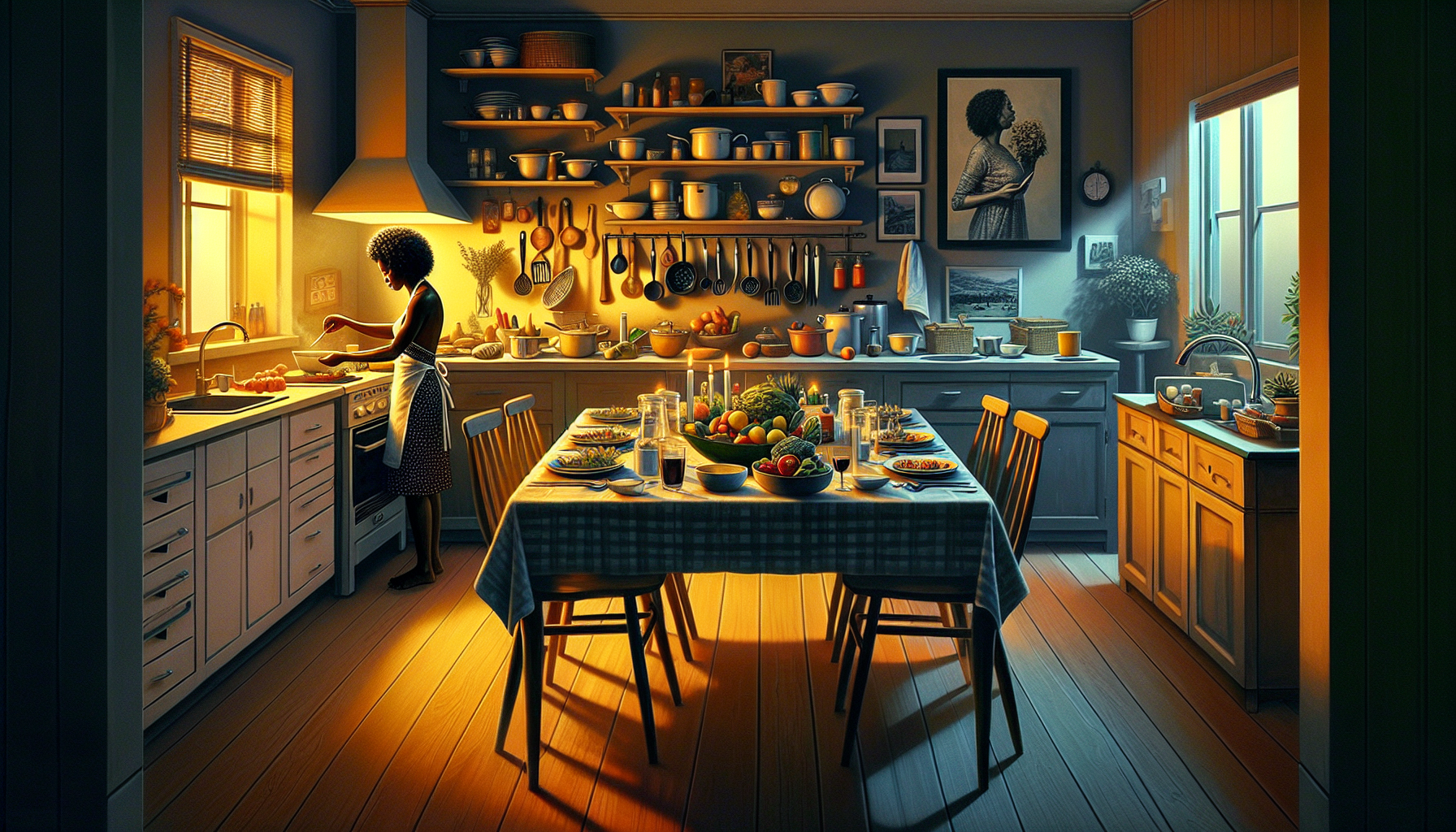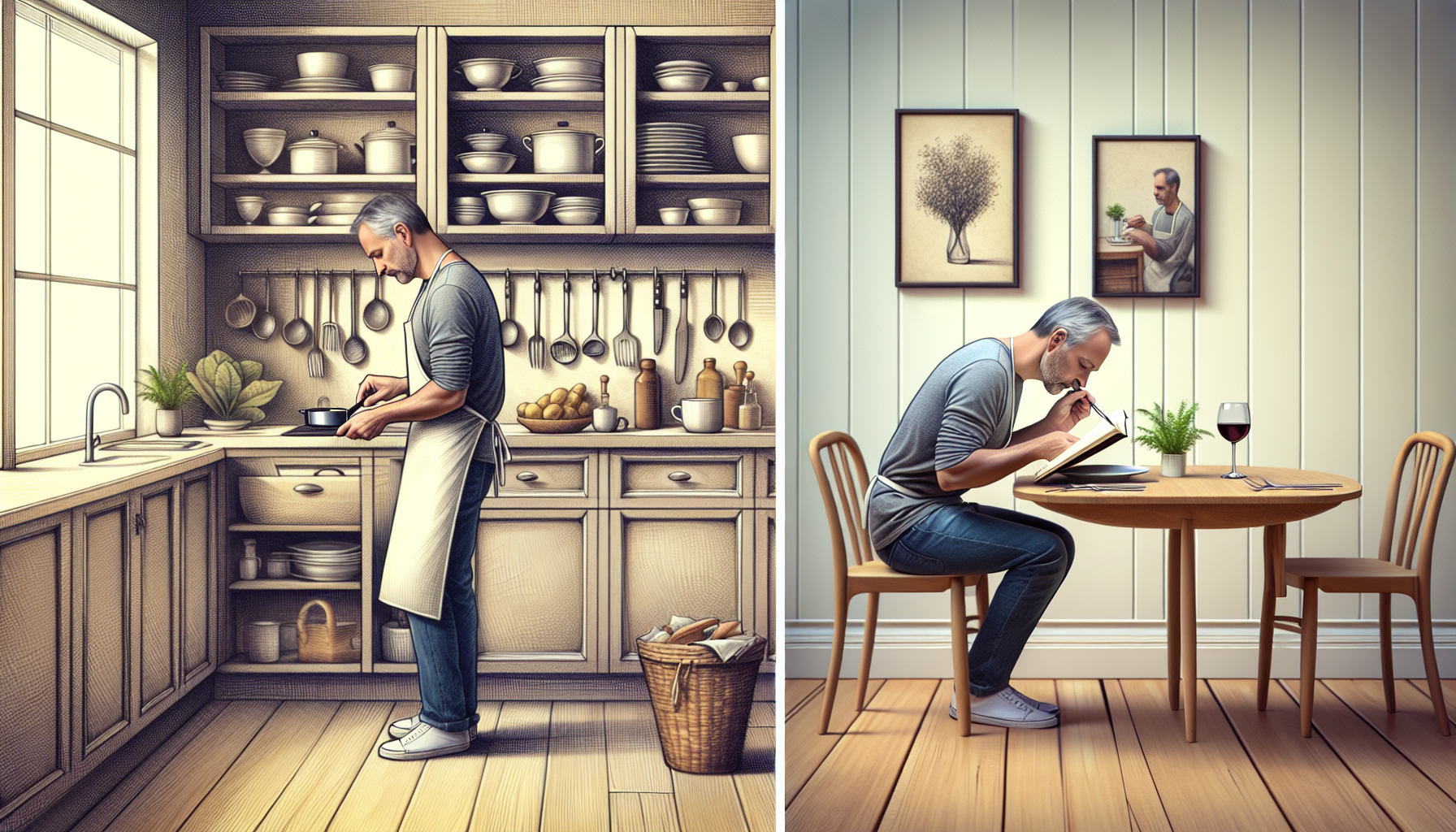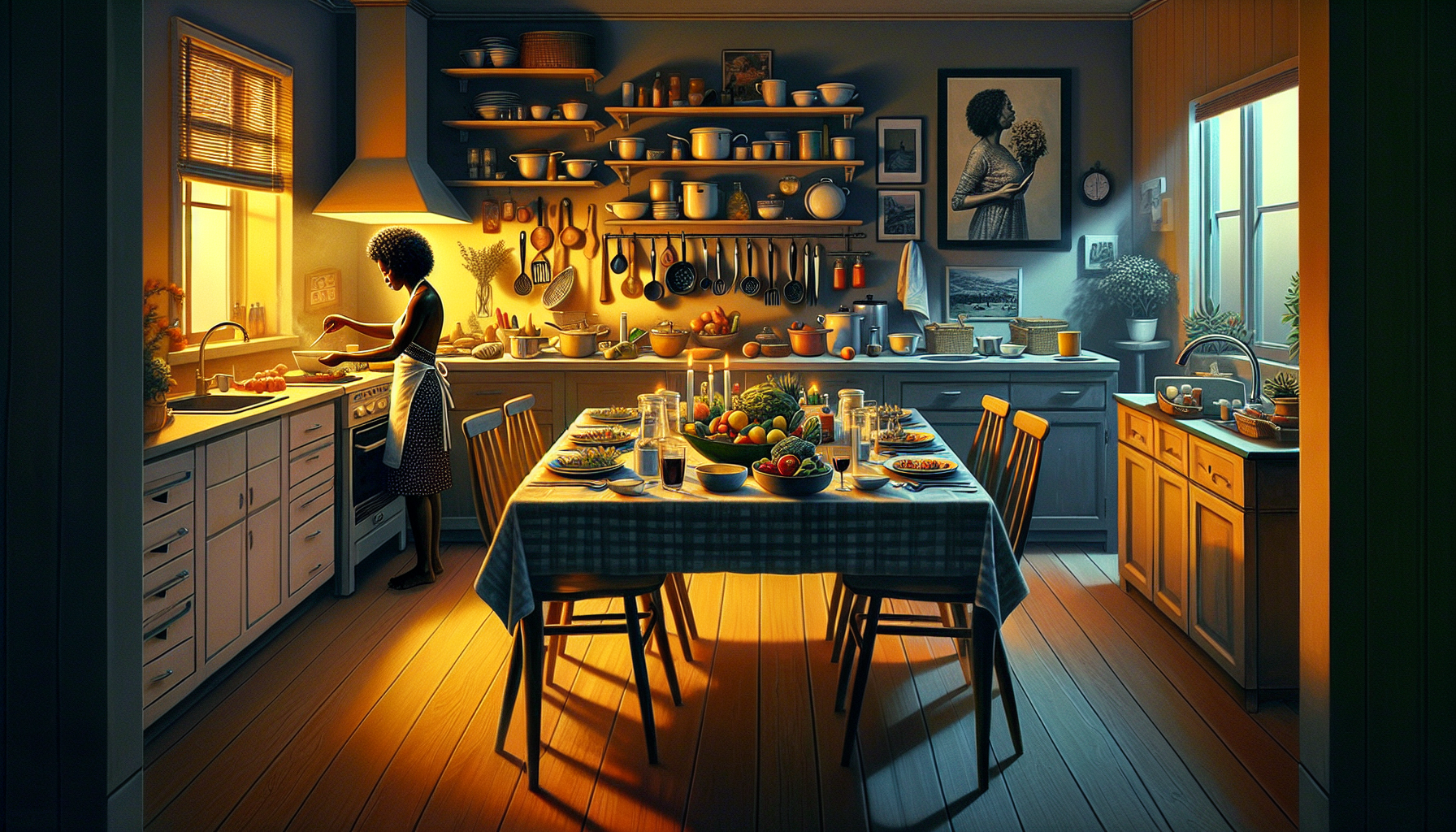Do you ever find yourself cooking and eating alone? Perhaps it’s a hurried bowl of cereal in the morning or a simple dinner after a long day at work. It may seem like a solitary activity, but have you ever stopped to consider the social implications of cooking and eating alone? In this article, we explore how this seemingly ordinary act can have a profound impact on our well-being, relationships, and sense of belonging. So grab a cup of tea, sit back, and let’s dig into the fascinating world of solo dining!

Food as a Social Experience
Shared Meals and Bonding
Food has always been a central element of socialization and bonding among people. Shared meals create opportunities for connection and strengthen relationships. When you cook and eat with others, it fosters a sense of togetherness and promotes a feeling of belonging. It allows you to share stories, laughter, and memorable experiences around the dinner table. The act of sharing food with others can create meaningful bonds and enhance social interactions in a unique way.
Cooking as a Social Activity
Cooking together can be a fun and engaging social activity. Whether it’s a family gathering, a group of friends, or a cooking club, preparing meals with others can be a collaborative and enjoyable experience. It encourages teamwork, communication, and cooperation. Cooking together also provides an opportunity to learn from one another, exchange culinary knowledge, and discover new recipes. It creates a sense of camaraderie and allows you to create lasting memories through shared experiences in the kitchen.
The Impact of Solo Dining on Social Relationships
While shared meals have their inherent benefits, there is also value in appreciating the experience of cooking and eating alone. Solo dining allows for self-reflection and personal development. It provides an opportunity to connect with oneself and develop a deeper understanding of individual preferences and tastes. However, it is important to acknowledge the potential impact of solo dining on social relationships.
Psychological Effects of Cooking and Eating Alone
Feelings of Loneliness and Isolation
Cooking and eating alone can sometimes evoke feelings of loneliness and isolation. Meals are often seen as a way to connect with others, and when you are dining alone, you may miss out on the social aspect of sharing a meal. It is important to be mindful of these emotions and find ways to mitigate them. This can include reaching out to friends and loved ones, engaging in virtual social activities, or finding alternative ways to create a sense of connection during solo dining experiences.
The Role of Food in Building Connections
Food has long been recognized as a universal language that transcends cultural and social boundaries. When you cook and share your creations with others, it can serve as a bridge that brings people together. Cooking and eating with others can create shared memories and strengthen bonds, fostering a sense of community and belonging. While cooking and eating alone may lack the direct social interactions, it is still possible to use food as a means to connect with others through virtual platforms, such as sharing recipes or participating in online cooking communities.
Self-Reflection and Personal Development
Cooking and eating alone provide an opportunity for self-reflection and personal development. It allows you to explore your culinary skills, experiment with new recipes, and develop a deeper appreciation for the food you consume. Through solitary dining experiences, you can discover your own preferences, indulge in mindful eating, and explore the connection between food and emotions. This can contribute to personal growth and a deeper understanding of oneself.
Health and Nutrition Considerations
The Influence of Social Support on Eating Habits
Social support plays a crucial role in promoting healthy eating habits. When you cook and eat with others, there is often an element of accountability and encouragement. This can positively influence your dietary choices and make it easier to maintain a balanced diet. On the other hand, cooking and dining alone may lack external input and support, which can sometimes lead to less healthy food choices or a lack of variety in meals. It is important to find ways to incorporate social support into solo dining experiences, such as seeking guidance from nutrition professionals, joining online cooking communities, or participating in virtual cooking classes.
Benefits and Risks of Cooking and Eating Alone
Cooking and eating alone come with both benefits and risks. On the positive side, solo dining allows for greater control over meal choices, portion sizes, and ingredient selection. It provides an opportunity to prioritize personal dietary needs and preferences. However, it is essential to be mindful of potential risks, such as the temptation to rely on convenience foods or skip meals altogether. Solo diners must prioritize nutritional balance, variety, and establish healthy eating habits to maintain overall well-being.
Balancing Nutritional Needs without External Input
When cooking and dining alone, it can sometimes be challenging to strike a balance between meeting nutritional needs and maintaining variety in meals. Without external input or the influence of others, solo diners may fall into repetitive eating patterns or neglect certain food groups. It is important to actively seek out nutritional information, meal planning resources, or consult with professionals to ensure a well-rounded and nourishing diet. This can help maintain optimal health and prevent nutritional imbalances caused by solo dining.
Cultural and Societal Perspectives
Cultural Norms and Expectations Surrounding Meals
Cultural norms and expectations surrounding meals can significantly impact the way we perceive solo dining. In some cultures, the act of cooking and eating alone may be stigmatized or viewed as a sign of loneliness or social isolation. Conversely, there are cultures where solo dining is embraced as an opportunity for self-care and self-enjoyment. Understanding and respecting cultural perspectives can help foster a more inclusive and accepting attitude toward solo dining experiences.
Stigma and Judgment Associated with Solo Dining
Unfortunately, there can be a certain level of stigma and judgment associated with solo dining. Society often places importance on communal meals, and dining alone may be seen as a deviation from the norm. This can lead to feelings of self-consciousness or anxiety when eating alone in public settings. It is crucial to challenge and overcome these stereotypes, recognizing that solo dining can be a deliberate choice that allows for personal growth, enjoyment, and independence.
Addressing Stereotypes and Changing Attitudes
To create a more inclusive and supportive environment for solo diners, it is necessary to address and challenge stereotypes surrounding solo dining. Promoting awareness and understanding of the various reasons why people choose to dine alone can help dismantle negative perceptions. Emphasizing the positive aspects of solo dining, such as self-care, personal growth, and culinary exploration, can reshape societal attitudes and foster a more accepting and inclusive food culture.

Technology and the Rise of Solo Dining
The Impact of Technology on Eating Habits
The advent of technology has revolutionized the way we approach cooking and eating. It has significantly influenced our eating habits and the social dynamics of dining. With the rise of food delivery services and meal planning apps, solo diners have greater convenience and access to a variety of culinary options. Technology has also facilitated virtual connections, enabling individuals to share their dining experiences through social media platforms and participate in online communities centered around food.
Social Media and the Evolution of Food Culture
Social media platforms have become essential tools for sharing and exploring culinary experiences. Food photography, recipe sharing, and virtual communities dedicated to cooking and dining have reshaped food culture and the way we engage with food. For solo diners, social media can become a valuable resource for inspiration, recipe ideas, and connecting with others who share similar food interests. The evolution of food culture in the digital age has provided new opportunities for solo diners to connect, learn, and expand their culinary horizons.
Online Cooking Communities and Virtual Dinner Parties
In recent years, online cooking communities and virtual dinner parties have gained popularity, particularly among solo diners. These platforms create a sense of community and allow individuals to connect with like-minded people who share a passion for food. Virtual dinner parties provide a social experience that bridges the gap between cooking alone and dining with others. They allow for shared experiences, recipe exchanges, and conversations centered around food, even in the absence of physical proximity.
Alternative Dining Options for Solo Diners
Meal Delivery Services and Convenience
Meal delivery services offer a convenient alternative for solo diners. They provide pre-portioned ingredients and recipes, simplifying the cooking process and reducing food waste. These services cater to individual meal plans and dietary preferences, ensuring that solo diners have access to healthy and varied meals without the need for extensive meal planning or grocery shopping. Meal delivery services also offer the benefit of introducing new flavors, ingredients, and cooking techniques, allowing solo diners to expand their culinary repertoire.
Pop-Up Dining Experiences for Individuals
Pop-up dining experiences designed specifically for solo diners have emerged as a way to foster community and address the social aspects of solo dining. These events create opportunities for individuals to come together, share a meal, and connect with others who appreciate the art of dining alone. Pop-up dining experiences often feature communal tables, where solo diners can enjoy a meal while engaging in conversations with fellow diners. This innovative approach to solo dining encourages social interaction and eliminates the feelings of isolation that can arise when dining alone.
Solo Dining Experiences in Public Spaces
Public spaces, such as parks, cafes, and food stalls, can also provide opportunities for solo diners to enjoy their meals in a social setting. These spaces accommodate individual diners, creating an inclusive environment where people can connect with others or simply observe and engage with the surrounding community. Creating public spaces that cater to the needs of solo diners encourages a sense of belonging and promotes a more inclusive food culture.
Coping Strategies for Cooking and Eating Alone
Developing Cooking Skills and Creativity
When cooking and eating alone, developing and honing cooking skills can enhance the overall dining experience. Investing time in learning new recipes, techniques, and experimenting in the kitchen can elevate the pleasure of preparing meals for oneself. It encourages creativity, self-expression, and the ability to adapt meals to personal preferences. Developing cooking skills not only improves the quality of the meals but also instills confidence and a sense of accomplishment.
Creating Rituals and Appreciating Me-Time
Solo dining provides an opportunity to create meaningful rituals centered around food and self-care. Establishing regular mealtime routines, setting a beautifully arranged table, or creating a calming ambiance can enhance the enjoyment of dining alone. Embracing solo dining as a form of self-appreciation and self-care can shift the focus from the absence of social interactions to the celebration of personal time and nourishment.
Fostering Virtual or Offline Social Connections
While dining alone physically, it is still possible to foster social connections virtually or offline. Engaging in online cooking communities, participating in virtual cooking classes, or joining food-centered events and workshops can provide a sense of connection with others who share similar interests. Offline activities, such as attending food festivals, joining cooking clubs, or organizing potluck dinners, allow for in-person interaction and the opportunity to meet new people who appreciate the art of cooking and dining.
Implications for Public Health and Well-being
Addressing Food Insecurity
Considering the social implications of cooking and eating alone is also crucial when addressing public health and well-being. In situations of food insecurity, where individuals may not have access to adequate food resources, the ability to cook and dine alone may be limited. It is essential to implement programs and initiatives that ensure access to nutritious meals for individuals who may not have the social or economic resources to engage in solo dining experiences.
Promoting Healthy Eating Habits for Individuals
Promoting healthy eating habits for individuals, regardless of their social dining preferences, is of paramount importance. Providing education and resources that focus on balancing nutritional needs, portion control, and healthy cooking techniques can help individuals make informed choices when dining alone. Emphasizing the importance of a well-rounded diet, mindful eating practices, and the incorporation of nutritious ingredients can contribute to improved overall health and well-being.
Building Supportive Communities and Spaces
Creating supportive communities and spaces is essential for those who choose to cook and eat alone. By fostering inclusive environments that recognize and celebrate the diversity of dining preferences, individuals can feel more comfortable and accepted in their solo dining experiences. Encouraging social interactions, organizing events that cater to solo diners, and providing resources that promote healthy eating and culinary exploration can contribute to the well-being of individuals who engage in solo dining.
Impact of COVID-19 on Solo Dining
Increased Frequency of Cooking and Eating Alone
The COVID-19 pandemic has significantly impacted the way individuals cook and dine. With stay-at-home orders and social distancing measures in place, the frequency of cooking and eating alone has increased. Individuals have had to adapt to the circumstances by preparing their own meals, often without the social interactions that were previously enjoyed in shared dining experiences. This adaptation has led to a reconsideration of the social implications and importance of solo dining.
Adapting to Isolation and Maintaining Social Connections
As individuals adapted to the isolation and limited social interactions during the pandemic, finding ways to maintain social connections while dining alone became crucial. Virtual dinner parties, video calls during meals, and sharing recipes and cooking experiences online have become strategies to bridge the social gap and recreate the sense of community even in times of physical separation. The pandemic has highlighted the resiliency of individuals in finding creative ways to maintain social connections and support through food.
The Future of Solo Dining Post-Pandemic
The impact of the COVID-19 pandemic on solo dining will likely have long-lasting effects on the way individuals approach cooking and dining. As society adapts to a post-pandemic reality, there may be an increased emphasis on the importance of self-sufficiency, personal well-being, and the appreciation of solo dining experiences. The lessons learned during the pandemic, such as the value of cooking at home and finding joy in one’s own company, may continue to shape the future of solo dining, even after social restrictions have been lifted.
The Art of Enjoying Cuisine Alone
Embracing the Pleasure of Cooking for Oneself
Embracing the pleasure of cooking for oneself is an essential aspect of the art of enjoying cuisine alone. Recognizing the value of self-nourishment, indulging in favorite foods, and celebrating personal culinary preferences can transform a meal into a delightful experience. Cooking for oneself provides an opportunity for self-expression, creativity, and self-care, allowing individuals to savor the joy of culinary exploration without the constraints of external expectations.
Exploring Flavors and Experimenting with Recipes
Dining alone provides a unique opportunity to explore flavors, experiment with recipes, and indulge in culinary adventures. It frees individuals from the need to cater to the tastes and dietary restrictions of others, allowing for greater creativity and exploration in the kitchen. Trying new ingredients, experimenting with different cuisines, and pushing culinary boundaries can lead to exciting discoveries and a deeper appreciation for the art of cooking.
Finding Joy and Appreciation in Solo Dining
Amidst the societal focus on shared meals and communal dining experiences, finding joy, and appreciation in solo dining is essential. Developing a positive mindset and embracing the solitude that comes with dining alone can enhance the overall experience. It allows individuals to fully immerse themselves in the flavors, textures, and aromas of the food, creating a moment of mindfulness and enjoyment. Cultivating gratitude for the opportunity to nourish oneself and celebrate the art of dining alone can transform an ordinary meal into a truly special occasion.
In conclusion, cooking and eating alone have profound social implications that impact our relationships, mental well-being, and overall dining experiences. While shared meals and social interaction around food are seen as essential, solo dining should be embraced and celebrated for the unique opportunities it presents. By acknowledging the psychological effects, considering health and nutrition considerations, respecting cultural perspectives, leveraging technology, exploring alternative dining options, adopting coping strategies, addressing public health implications, recognizing the impact of the COVID-19 pandemic, and embracing the art of enjoying cuisine alone, we can create a more inclusive, supportive, and fulfilling food culture that caters to solo diners as well. So, treat yourself to a delicious meal, savor each bite, and relish in the joy of dining alone.
